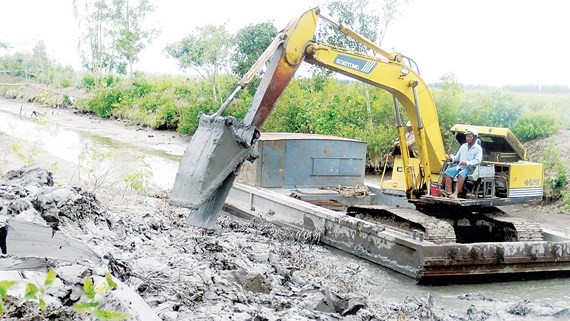
The Ministry of Agriculture and Rural Development requested localities to adopt measures against drought and salinity intrusion aiming to minimize losses.
The Irrigation Department under the Ministry, said from end of February 2018, concentration of saline water was 4g/l with 15- 45km intrusion in many parts of coastal districts in the Mekong delta.
Areas along Vam Co river, salinity is measured 0 – 1.3 gram per liter lower than in 2017 meanwhile areas in Cuu Long river mouth is also 0.5 – 5.8 gram per liter compared to last year.
Through observation, it is likely that the upstream in Mekong river in dry season in 2018 has higher water level than last year which facilitates water supply in agricultural production in the Mekong delta.
Leaders of the Institute of Irrigation of Vietnam said in March, salinity intrusion will enter deeply into coastal areas in the Mekong delta and salinity will ebb and fresh water supply will be plenty at the end of March.
In reality, salinity intrusion took place in coastal areas in Kien Giang, Tien Giang, Ben Tre, and Tra Vinh yet it was so worse as last year and the dry season in 2016.
Giong Ke village head Danh Hau said this year, learning lessons in previous years, the local government and residents closed all drainage system when salinity appeared before Tet holiday ( the Lunar New Year falling in February 15) as well as kept an eye on the development of salty water.
At present, over 1,000 hectare paddy field in Binh Giang Commune in Kien Giang Province is nearly harvested and salinity has not affected the paddy field while farmers in communes Hoa Dien and Kien Binh are worrying because of salinity intrusion.
Farmer Tran Van Tuan in Kien Binh Commune said that farmers discovered the color of water changed thinking that salinity intruded; accordingly, farmers informed local administrators to close gate of dam avoiding wider intrusion.
Locals in Ben Tre Province’s Ba Tri District encountered difficulties due to lack of fresh water for daily activities while their peers in other coastal areas have not.
The Hydrology Meteorology Forecast Center in Ben Tre Province said salinity intrusion took place yet it is not serious yet it is forecast that the situation will be worse in next time; subsequently, people and administrations should keep track on the situation and have timely measures.
To prevent drought and salinity, Ben Tre has implemented construction of water reservoirs, embankment, and dredging canals totally worth VND110 billion.
Director of the Department of Agriculture and Rural Development in Long An Nguyen Van Hoang said that salt water concentration will increase in next time according to forecast of the province’s Hydrology Meteorology Forecast Center.
Consequently, leaders have prepared measures to have enough water supply for production. Farmers will harvest rice in 222,000 ha paddy field in early June.
Additionally, agriculture sector encouraged people to save water and utilize modern watering system in paddy field and orchards in places short of fresh water to ensure production productivity.
The Fruit Research Institute of the South noted that the Mekong delta is the country’s major production for export; therefore, protection of orchards in dry season is a pivotal mission.
At first, farmers need to reinforce dykes to prevent saltwater intrusion and increase fresh water reservoir for watering trees during dry season.
As per the Ministry of Agriculture and Rural Development, over 1.65 million hectare crop was planted in April and harvest in June; hence, local government have to keep close track on the development of salinity intrusion.
People in coastal areas should plant short-day seedlings and harvest before salinity is plenty while farmers in place which saline water intrusion take place often should transfer to grow other trees instead rice.
It is planned that in 2018, the Mekong delta will transfer 118,290 ha paddy field into growing short-day tree or growing perennial plants so as to have more profit.
























